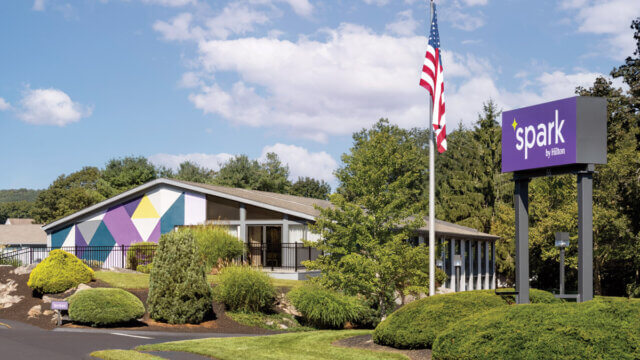MCLEAN, VA—Hilton Worldwide Holdings Inc. had a 22.6% decrease in RevPAR for the first quarter of 2020, mainly due to the effect of the COVID-19 pandemic. Despite these results, leadership pointed to positive signs of recovery.
“To ensure we effectively navigate this challenging time, we focused our priorities on three core areas: protect our people, protect our core business and prepare for recovery,” said Christopher J. Nassetta, president/CEO, Hilton, in the earnings call. “While our long-term goal remains the same—to drive loyalty across all of our stakeholders—the current situations requires greater levels of responsiveness and preparedness in the near term. With this in mind, we work closely with industry associations and the administration to advocate on behalf of our team members and hotel owners and to help shape the broader recovery.”
He continued, “Given our leadership team’s extensive crisis management experience, coupled with the global nature of our business, we had a relatively early glimpse of the impact this pandemic started to have on the Asia-Pacific region. In response, we took swift action to protect our business and ensure that we have sufficient liquidity to operate in these unprecedented times. With travel demand at record lows, we currently have suspended operations at approximately 950 or 16% of our hotels globally, including approximately 10% of our hotels in the Americas, 60% in Europe the Middle East and Africa and 15% of our hotels in Asia-Pacific. At the hotel level, we acted quickly at the beginning of the crisis to make decisions to help our owners respond, including suspending hotel operations, temporarily suspending brand and operating standards, deferring capital expenditure requirements, eliminating quality assurance audits and allowing the use of FF&E reserves for operating expenses.”
Nassetta expects the second quarter results to truly show the effects of the pandemic. “Overall, we do not think our first quarter results provide clear insight into the current environment and, given the timing of the pandemic, we expect a much more dramatic impact on our second quarter results,” he said. “With travel at a virtual standstill, we expect systemwide RevPAR declines roughly 90% in April.”
But, he said, Hilton is seeing glimmers of travels resuming and economies reopening. “In China, nearly all 150 hotels that have been closed due to the pandemic have since reopened with occupancies reaching more than 50% during the May Day holiday this past weekend, up significantly from 9% in early February,” he said. “Additionally, the majority of our previously halted construction projects in China have restarted. In the U.S. and Europe, we’re starting to see sensible and staged reopenings of economies. Temporary hotel suspensions have plateaued and we are now seeing reopening requests.”
He continued, “Our sales teams are engaged with customers on business for the back half of the year, 2021 and beyond. In the last week alone, we’ve booked tens of millions of dollars in group business in the Americas. In addition, we are starting to see double-digit increases in digital traffic and booking activity across all segments. Global occupancy levels have gone from a low point of 13% to 23% currently. Assuming we start to see mobility and we don’t have a significant recurrence, demand should slowly rebuild in the third quarter.”
For the three months ended March 31, 2020, system-wide comparable RevPAR decreased 22.6% primarily as a result of decreases in occupancy, and management and franchise fee revenues decreased 18%. The decreases were due to the COVID-19 pandemic and the related reduction in global travel and tourism, which required the complete and partial suspensions of hotel operations at many of Hilton’s properties.
Net income and Adjusted EBITDA were $18 million and $363 million, respectively compared to $159 million and $499 million, respectively, for the three months ended March 31, 2019.
Development
In the first quarter of 2020, Hilton opened 67 new hotels, totaling 8,800 rooms, and achieved net unit growth of more than 6,100 rooms.
Additionally, during the quarter, Hilton signed the largest multi-brand deal in company history with Resorts World Las Vegas for a 3,500 room resort uniting Hilton Hotels & Resorts, LXR Hotels and Resorts and Conrad Hotels and Resorts.
As of March 31, 2020, Hilton’s development pipeline totaled nearly 2,670 hotels consisting of more than 405,000 rooms throughout 120 countries and territories, including 35 countries and territories where Hilton does not currently have any open hotels. Additionally, of the rooms in the development pipeline, 223,000 rooms were located outside the U.S., and 213,000 rooms were under construction.
Balance Sheet and Liquidity
As of March 31, 2020, Hilton had $9.6 billion of long-term debt outstanding, excluding deferred financing costs and discount, with a weighted average interest rate of 3.92%. Excluding finance lease liabilities and other debt of Hilton’s consolidated variable interest entities, Hilton had $9.3 billion of long-term debt outstanding with a weighted average interest rate of 3.88%and no maturities until 2024.
Total cash and cash equivalents were $1.8 billion as of March 31, 2020, including $71 million of restricted cash and cash equivalents. During the quarter, Hilton borrowed the remaining amount available under its $1.75 billion senior secured credit facility, as a precautionary measure in response to the COVID-19 pandemic. In April 2020, Hilton continued to take action to solidify its cash position, including the pre-sale of Hilton Honors points for $1 billion and the issuance of $1 billion aggregate principal amount of senior notes. Giving effect to these transactions, Hilton would have had $3.8 billion of cash, restricted cash and cash equivalents as of March 31, 2020.
During the first quarter of 2020, Hilton repurchased 2.6 million shares of its common stock at a cost of approximately $279 million and an average price per share of $107.26. Since the inception of Hilton’s stock repurchase program in March 2017, Hilton has repurchased approximately 56.6 million shares of its common stock for approximately $4.4 billion at an average price per share of $78.40. In March 2020, Hilton’s board of directors authorized an additional $2 billion for share repurchases under its stock repurchase program. The amount remaining under Hilton’s current stock repurchase program is approximately $2.2 billion.
In March 2020, Hilton paid a quarterly cash dividend of $0.15 per share on shares of its common stock, for a total of $42 million.
Hilton formally suspended share repurchases of its common stock and dividend payments on March 26, 2020, after the board of directors’ additional share repurchase authorization, as a result of efforts to preserve capital and maintain liquidity. The stock repurchase program remains authorized by the board of directors, and Hilton may resume share repurchases in the future at any time, depending upon market conditions, capital needs and other factors. No share repurchases were made after March 5, 2020, and no new cash dividends have been declared subsequent to the payment of the previously declared cash dividend.

